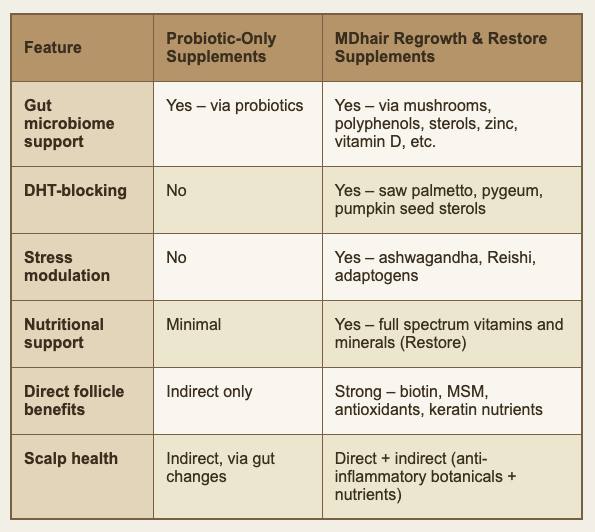Can healthy gut microbiome help regrow hair?
Key Points
- Key Points: The gut–hair axis links microbiome balance with scalp health, nutrient absorption, inflammation control, and hormone regulation—making gut health vital for hair growth.
- Key Points: Clinical research shows probiotics can boost hair density, but probiotic-only supplements miss key factors like DHT-blocking, nutrient replenishment, and stress modulation.
- Key Points: MDhair’s Regrowth and Restore Supplements go beyond probiotics by combining prebiotics, adaptogens, DHT blockers, and full-spectrum nutrients to support gut and follicle health.
Hair loss is one of the most common concerns for both men and women. While genetics, stress, and hormones are usually the first suspects, a surprising new player is gaining attention in scientific research: the gut microbiome.
Your gut is home to trillions of bacteria, fungi, and other microbes that regulate digestion, immunity, and even your skin and scalp health. Emerging evidence shows that an imbalanced gut microbiome can accelerate hair thinning, while a healthy gut can actively support hair regrowth. This is known as the gut–hair axis.
In this article, we’ll break down the science of the gut–hair connection, explore new studies on probiotics for hair growth, and show how the ingredients in MDhair’s Regrowth and Restore Supplements support both gut health and hair follicles — giving them advantages over probiotic-only formulas.
What Is the Gut–Hair Axis?
The gut–hair axis describes how changes in the intestinal microbiome can influence the health of your scalp and hair follicles. Scientists believe the connection works through three main pathways:
Nutrient Absorption
The gut absorbs vitamins and minerals crucial for hair growth (biotin, vitamin D, zinc, iron, selenium). If the gut lining is damaged or inflamed, absorption drops, and hair follicles are left undernourished.
Microbial Production of Nutrients and Metabolites
Healthy gut bacteria produce short-chain fatty acids (SCFAs) and hair-essential nutrients like biotin and folate. These molecules regulate inflammation, improve immune balance, and fuel rapidly dividing cells like those in the hair bulb.
Immune and Hormonal Regulation
The gut contains 70% of the immune system. Dysbiosis increases gut permeability (“leaky gut”), leading to chronic inflammation that can disrupt the hair cycle. The gut also influences hormones, including androgens (DHT) and stress hormones like cortisol, both of which affect hair shedding.
Can Probiotics Help With Hair Loss?
A recent placebo-controlled clinical trial tested whether probiotics could improve hair growth. The study combined three Bacillus probiotics (B. coagulans, B. subtilis, B. clausii) with saw palmetto extract, a natural DHT blocker.
After 24 weeks, participants experienced:
- 30% increase in hair density
- 25% increase in follicle count
- Positive changes in the scalp microbiome, with fewer inflammatory bacteria and more protective species
This is the first human study to prove that improving the gut microbiome can directly enhance hair density and scalp microbial balance.
Why Gut Health Alone Isn’t Enough
While probiotics are promising, most probiotic-only supplements stop at microbiome balance. They don’t address other critical drivers of hair loss:
- DHT hormone activity (the leading cause of male and female pattern baldness)
- Nutritional deficiencies (iron, vitamin D, zinc, B-vitamins)
- Stress and cortisol imbalance
- Oxidative stress and follicle inflammation
That’s where MDhair supplements stand apart: they combine microbiome-supportive botanicals with direct hair growth nutrients for a more comprehensive solution.
MDhair Regrowth Supplement: Targeted for Hair Thinning
The Regrowth Supplement is formulated for people with androgenetic alopecia (pattern baldness), stress-related shedding, or early-stage thinning.
Gut-Friendly Benefits
- Mushrooms (Reishi and maitake) are rich in beta-glucans, natural prebiotic fibers that nourish beneficial gut bacteria and strengthen immunity.
- Ashwagandha is an adaptogen that lowers cortisol, protects the gut barrier, and reduces stress-related shedding.
- Polyphenols (green tea, nettle, broccoli, pumpkin seed, cayenne) – act as prebiotics, increase good bacteria (Lactobacillus, Bifidobacterium), and reduce gut inflammation.
- Plant sterols (from saw palmetto, pygeum, pumpkin) – improve intestinal barrier function and reduce inflammation.
Direct Hair Growth Benefits
- Saw Palmetto (200 mg) & Pygeum (100 mg): Block DHT at the follicle level, slowing pattern hair loss.
- Biotin (5000 mcg): Boosts keratin production for stronger, thicker hair.
- MSM: Provides sulfur, a building block for collagen and keratin.
- Vitamins D & E, Zinc, Selenium, Copper: Support follicle energy, antioxidant defense, and hair shaft formation.
Key takeaway: Regrowth supports the gut–hair axis with prebiotics and adaptogens while directly blocking DHT and fueling new growth.
MDhair Restore Supplement: Comprehensive Nutrient Coverage
The Restore Supplement is best for people with diffuse thinning, postpartum hair loss, or nutrient deficiencies.
Gut-Friendly Benefits
- Zinc & Vitamin D: Strengthen the intestinal barrier and regulate the immune system.
- Selenium: Supports antioxidant enzymes that protect gut and follicle cells.
- B-vitamins and biotin (2550 mcg): Gut bacteria naturally produce these, but supplementation ensures adequate microbiome and hair growth levels.
- Plant sterols & Saw Palmetto: Mild DHT-blockers also benefit gut lining integrity.
Direct Hair Growth Benefits
- Broad-spectrum vitamins & minerals: Covers all common deficiency-related hair loss triggers (iron, folate, B12, magnesium).
- Antioxidants (C, E, selenium) reduce oxidative stress, damaging follicles and gut cells.
- Nutritional safety net: Ensures the body and hair follicles receive everything needed to function, even if gut absorption is less efficient.
Key takeaway: Restore acts as a complete multivitamin and a hair supplement, helping correct hidden deficiencies that harm gut and hair health.
MDhair vs. Probiotic-Only Supplements

Best Supplements for the Gut–Hair Axis
If you want to maximize hair growth, the best supplement directly supports both the gut microbiome and the hair follicle.
- Probiotic-only supplements rebalance gut bacteria but leave out key nutrients and DHT-blocking botanicals.
- MDhair Regrowth Supplement combines adaptogens, prebiotics, and powerful DHT blockers with vitamins and minerals.
- MDhair Restore Supplement ensures that no nutrient deficiencies limit gut or hair health while supporting the scalp and follicles.
Together, these formulas address all sides of the gut–hair connection: microbial balance, stress, nutrient absorption, inflammation, and hormonal regulation.
Final Word
The gut–hair axis is one of the most exciting areas of hair loss research today. By nurturing your gut microbiome, you can reduce inflammation, improve nutrient absorption, and even balance hormones — all of which contribute to healthier, fuller hair.
While probiotics are a promising first step, MDhair’s Regrowth and Restore Supplements offer a more complete approach:
- Feeding the microbiome with prebiotics and polyphenols
- Blocking DHT at the follicle level
- Correcting nutrient deficiencies
- Reducing stress and oxidative damage
The result is a dual-action strategy that supports gut health and directly stimulates hair growth.
Want to know which supplement is right for you?
- Choose MDhair's Regrowth Supplements if you have androgenetic alopecia, stress-related shedding, or want stronger DHT protection.
- Choose MDhair's Restore Supplements if your hair loss is linked to postpartum changes, nutritional deficiencies, or overall health recovery.
Both formulas work hand-in-hand with your gut microbiome to help you naturally regain thicker, healthier hair.
References
- O’Neill CA, Monteleone G, McLaughlin JT, Paus R. The gut-skin axis in health and disease: A paradigm with therapeutic implications. BioEssays. 2016;38(11):1167–1176.
- Jung DR, et al. Comparative analysis of scalp and gut microbiome in androgenetic alopecia: A Korean cross-sectional study. Front Microbiol. 2022;13:1076242.
- Burma NE, et al. Cutaneous and gut dysbiosis in alopecia areata: A review. JID Innovations. 2025;5(4):100363.
- Yin CS, et al. Efficacy of probiotics in hair growth and dandruff control: A systematic review and meta-analysis. Heliyon. 2024;10(9):e29539.
- Grimshaw SG, et al. The diversity and abundance of fungi and bacteria on the healthy and dandruff-affected human scalp. PLoS One. 2019;14(12):e0225796.
- Carrington AE, et al. The gut and skin microbiome in alopecia: Associations and interventions. J Clin Aesthet Dermatol. 2023;16(10):59–64.
- Rea K, Dinan TG, Cryan JF. The microbiota–gut–brain axis: The influence of gut microbiota on neuropsychiatry. Mol Psychiatry. 2016;21:738–748.
- Sudeep HV, et al. Oral and topical administration of a standardized saw palmetto oil reduces hair fall and improves hair growth in androgenetic alopecia subjects: A 16-week randomized, placebo-controlled study. Clin Cosmet Investig Dermatol. 2023;16:3251–3266.
- Nie Q, et al. Dietary polyphenols and gut microbiota: Interactions and implications for human health. Front Nutr. 2021;8:634693.
- Wasser SP. Medicinal mushrooms as a source of antitumor and immunomodulating polysaccharides. Appl Microbiol Biotechnol. 2002;60(3):258–274.
- Rideout TC, Chan YM, Harding SV, Jones PJH. Low and moderate-fat plant sterol diets reduce cholesterol absorption and plasma LDL cholesterol concentration in hypercholesterolemic subjects. Am J Clin Nutr. 2006;83(3): 570–576.
- Almohanna HM, Ahmed AA, Tsatalis JP, Tosti A. The role of vitamins and minerals in hair loss: A review. Dermatol Ther (Heidelb). 2019;9(1):51–70.
Find the most effective hair growth products for you by taking the free hair assessment.




